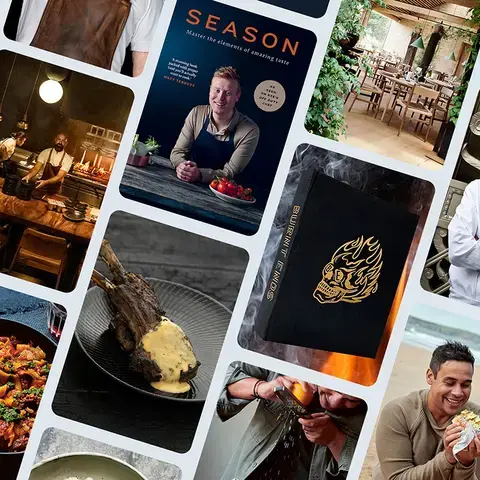The restaurant industry has undergone a period of profound change in the last two years. The coronavirus pandemic has catalysed and hastened problems of supply, liquidity, staffing and more, which were simmering before the disease raised its ugly head in 2020. Now as the tide recedes, and we see a completely different industry, it’s a good time to ask what the future of restaurant criticism might look like.
Pete Wells is the world-renowned restaurant critic for the New York Times, and for many he is at the very top of his game. The problem is that nobody really knows what that game will look like in the near future, or even if the game of restaurant reviewing has a future. Wells is not completely pessimistic, though.
“No matter what happens, there will still be a few people left who want to read restaurant reviews,” he says.
Things have changed in the last decade, and changed a lot. The user-generated review appeared and became the standard way for people to quickly get a sense of a restaurant and the quality of its offering. However, user reviews are so ubiquitous that perhaps their value is somewhat diminished.
“I think that people are so used to crowdsourcing reviews online. You can’t really trust an individual user-generated review, people can’t trust them, but they trust them in the aggregate. People are reasonably comfortable with having an algorithm telling them what they’re interested in and the way that happens with food is through Instagram. For people who really follow food and restaurants on Instagram, they’ll see what the algorithm serves them. I hear people talk admiringly about how well the TikTok algorithm knows them, almost like a girlfriend or something.”
Once upon a time, the restaurant critic was a powerful figure within the restaurant-industry-media ecosystem. They could make or break a restaurant. But the digitisation of news and social media has undermined their position, just as they have the journalist’s once-tight grip on information. Chefs don’t really need critics anymore - they have their own media that they can control directly.
“In the pre-social days, chefs would really worry about how they were going to get press for their ten-year-old restaurant when it's stopped being interesting to people and the new places are getting all the attention,” says Wells. “Now every new dish they can post on Instagram, and they can start a conversation that way. In a lot of ways, it’s great, but the critic is now just one of many voices out there."
So if chefs don’t need the critic, and the diner doesn’t need the critic, who does?
“That’s what I worry about, and I’m prone to worrying. I think there are some readers who enjoy reading reviews and someone else’s opinions and impressions of a place. Some people like a critic who can put things in context and compare a restaurant to, say, five other restaurants, and bring a broader frame of reference to it. Not everyone wants that and I don’t think younger readers really want that.”
And yet there is nothing quite as acerbically appealing as a critic like Wells in the full flow of taking down a restaurant consumed by its own self-regard. There is still, for now it seems, an appetite for restaurant reviews.
“These days people like extremes of opinion, they love or hate it, a strong positive or a strong negative review. The Internet has been pushing things that way,” says Wells. “The algorithm promotes a strong reaction, which cuts through the noise. Most of my reviews are kind of in the middle, though. I write about restaurants that are pretty good, but not amazing."
“I try to find the good ones, but not everything should be treated with superlatives. The headline can’t always be ‘Is This the Best Restaurant in the Universe?'.”
Wells clearly understands what it takes to open and run a restaurant, especially a fine-dining one. Chefs and restaurateurs sacrifice everything - financial security, family life, holidays - in order to chase their dream of welcoming guests into their dining rooms. A restaurant critic has to be somewhat cold in order to take a hatchet to those dreams.
“I try to fix a target carefully,” says Wells. “I really try not to write negative reviews of places that people haven’t heard of. There has to be a place where the chef has to be famous enough that people are lining up to get in already. There has to be some built-in interest where you don’t have to explain to people where the restaurant is or why you’re reviewing it. You’re actually saving somebody a couple of hundred dollars, whereas if you didn’t write the review, they might be next in line to walk in there."
Wells’ recent review of Eleven Madison Park, and his observations about the meat-free menu costing the same as the meat menu, comes to mind.
“When I feel OK about writing a negative review, is when I feel people might be at risk of wasting their money,” he says.
Then there was his evisceration of the once untouchable steakhouse institution, Peter Luger. You can tell Wells enjoyed writing that one, but in the broad scheme of things, one bad review can hardly dent the reputation of such a historical restaurant. Peter Luger will outlive us all.
“People like that experience [at Peter Luger] and the things they like about it aren’t really the things I was complaining about,” says Wells. “And they may even see that it’s gone downhill a little bit, but they don’t care. But I also think that they are serving way more people from out of the country than they were ten years ago and those people are arriving in big groups, probably tour groups and they just don’t know what they’re getting into.”
Is being a restaurant reviewer a realistic aspiration for a young journalist or writer? Or are we seeing the last gasps of a dying profession, something that will soon seem as obsolete as the fax machine or telegram?
“I don’t know how much longer the job is going to be around, although the interest in food doesn’t seem to be going away. The interest in restaurants just seems to grow and grow. I’m glad we still have a few critics left in New York City, we don’t have as many as we did 10 or 15 years ago, but we’re OK, London’s doing great. It’s a great job to have for a while, but I don’t think your body will let you do it your whole life."
Indeed, reviewing restaurants for a living can take a physical toll. Many a critic has had to deal with the consequences of an overly rich diet, midweek tasting menus and wine pairings.
“I don’t like to talk about it, but, I can’t really watch what I eat, but I have to watch what I drink,” he says. "I drink less and less to offset all the eating I have to do. It’s less fun. When it affects your body it’s not fun."
As the chef’s profile rises in society, and we look to them for instruction on not only what to eat but how to eat, perhaps there is an evolved role of the critic to check that public persona. Recently chefs have been exposed, not only for sexual abuse scandals, but also for constructing false narratives around sustainability and the farm-to-table aspect of their cuisine. Maybe restaurant reviewers should come back to what they were trained to do in the first place - journalism.
“Critics should look at these things along with the quality of the food, it all has to be there. It’s almost standard for food writing at the moment to just parrot whatever claims to goodness and virtue a chef or restaurant makes because people want to believe. Everybody wants to believe bedtime stories and nobody wants to find out it’s not true."
“There’s so much competition out there now, that people feel lucky to land a story or an interview, that the balance of power is much closer to the way things work in Hollywood. The way it works in Hollywood is the stars will try to pick the person who interviews them, they’ll veto journalists they think are too tough and food is much closer to that than it was a few years ago. It happened a lot sooner than I expected.”







